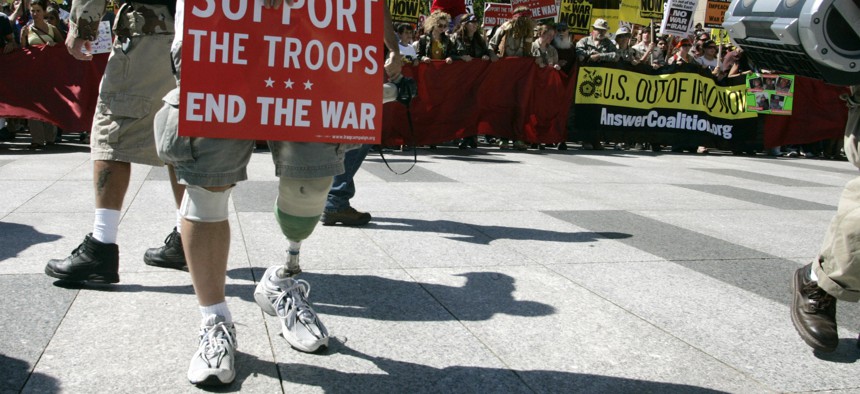
US Army veteran who was injured in Afghanistan in 2004 NICHOLAS KAMM/AFP
Afghanistan Veterans Struggling With News of Taliban Takeover
Advocates encourage veterans to use VA, veteran service organization resources for help.
Updated: 5:03 p.m.
An uptick in calls for support have veteran and military family advocates worried about veterans’ mental health following the rapid takeover of Afghanistan by the Taliban. The groups are putting more resources into providing veterans and their families the support they need.
Veterans “are having really acute emergency mental and emotional challenges right now, because of the images that they're seeing with the collapse in Afghanistan,” said Steven Schwab, the chief executive officer of the Elizabeth Dole Foundation, which supports military and veteran caregivers.
News coverage of Americans and Afghans trying to flee the Taliban after nearly 20 years of war has been difficult and upsetting for many who fought there. President Joe Biden called the images “gut-wrenching” for veterans, during his speech from the White House on Monday. The Department of Veterans Affairs sent out an email Monday telling veterans they are not alone and that it’s normal to feel distress or to question their sacrifices. The email listed common reactions they may have to the news, and the resources available to help them and their families.
Veterans, caregivers, and family members have been reaching out for help from organizations like the Dole Foundation and the Wounded Warrior Project. Schwab said they started to hear from families and caregivers on Friday, with spikes in contacts on Saturday and Sunday. Calls for help are continuing to pour in; they’ve heard from hundreds of people so far, with numbers nearing the thousands.
“They're having flashbacks, they're having severe mental and emotional health episodes where they're having anxiety attacks, and depressive shutdowns. So yeah, we're seeing huge spikes in anxiety and depression and withdrawal… And that's happening because of the images that we're seeing,” Schwab said of what the foundation has heard from veteran caregivers in the past few days.
The veteran advocacy community was caught off guard by the speed of the Taliban takeover over the past week, Schwab said, and their mission to help these veteran families is more critical now than ever. He’s worried that things could get worse in the days and weeks ahead, as the new reality on the ground in Afghanistan evolves.
Many people on social media have shared the Veterans Crisis Line as a resource to help struggling veterans, and the line has seen an uptick in calls. On Saturday, the hotline saw a four percent increase in calls compared to the same day and month last year, and on Sunday they saw a nine percent increase in calls, said Gary Kunich, a VA spokesman.
While the VA cannot say yet whether the increases are directly linked to news from Afghanistan, they are tracking the types of calls they are receiving and their subject matter to determine what issues are impacting veterans, he said. The VA is actively reaching out to veterans about the resources they can use, including local Vet Centers.
The Army’s Chief of Staff Gen. James McConville acknowledged in a letter Tuesday that soldiers, veterans, and their families may be struggling and asked that they check on one another.
“As we all reflect on the events of this past week in Afghanistan, I want you to know how much I appreciate your service and your sacrifice, and I could not be more proud of what you have accomplished,” he wrote.
Sergeant Major of the Army Michael Grinston also tweeted about his pride in those who deployed to Afghanistan, saying the recent events are not a reflection of their service.
Service members and their families can contact the Defense Department’s Military OneSource hotline and chat to access counseling and other resources. On Sunday, the call center received a 10 percent bump in calls related to the news in Afghanistan, according to Pentagon spokeswoman Lisa Lawrence.
“The majority of calls were participants with questions about how to get family members evacuated. The Military OneSource call center is directing participants to the U.S. Embassy in Afghanistan website,” she wrote in an email.
The Wounded Warrior Project’s CEO Mike Linnington, a retired U.S. Army three-star who served in Afghanistan, released a video message Monday saying he finds the images out of Afghanistan troubling and encouraging his fellow veterans to reach out to their battle buddies. Spokeswoman Sherry Sanderford said the Wounded Warrior Project will be contacting more than 30,000 veterans over the next few weeks and is increasing the support to its resource center and mental health triage team.
The Dole Foundation and its Hidden Heroes program is focused on providing all the resources it can to these families in crisis, including free respite care to disconnect from the television and get out of the house, Schwab said. The foundation also is hosting a forum this Thursday to bring together emotional and mental health experts to discuss ways caregivers and family members can help veterans in crisis.
Schwab said he just wants veterans to know that they matter and are appreciated.
“We need to do everything we can right now to let our veterans know that they met their mission, that their service mattered, that what they did mattered for this country. And what is happening on the ground there shouldn't impact the ways that they judge their contributions in Afghanistan,” he said.







